“This is where my career ends because this powerful guy is going to destroy me. But I’m not lying. We aren’t lying.”
BethAnn McLaughlin (2018)
Probably everyone has heard of the BethAnn McLaughlin aka @McLNeuro affair. Everything this person said on Twitter and elsewhere appears very likely to have been a lie. The full story which culminated with McLaughlin’s expulsion from Twitter, was covered first by Heavy, then by many others, like BuzzFeed, Daily Beast and even the New York Times, where McLaughlin admitted everything. I will add my own bit, with evidence of massive research fraud which McLaughlin is responsible for. In this regard, please also see this earlier article about McLaughlin’s western blots.
Tragic COVID-19 death of Sciencing-Bi, the bisexual Hopi sockpuppet
In brief: the neuroscientist, Twitter celebrity and founder of #MeTooSTEM, for whom half of academia was prepared to burn down the Vanderbilt University and stone its leadership for denying her tenure, was recently exposed as unhinged racist fraudster and sociopath. Some years ago, McLaughlin namely created the fictional Twitter personality @sciencing_bi, a bisexual female anthropologist who on 31 July 2020 allegedly died of COVID-19, having been forced by her evil Arizona State University to teach students in person. McLaughlin also declared to have shared the bed with @sciencing_bi, which at least was in a way true. It broke the hearts of many in academia, especially since @sciencing_bi account previously claimed to have been sexually harassed by same academic peers already publicly accused of sexual misconduct elsewhere.
Almost everyone accepted that @sciencing_bi was a real person, even if the account talked a lot of trash and behaved like McLaughlin’s over-loyal personal assistant. It even answered questions addressed to McLaughlin, with information only McLaughlin could have had. After the sockpuppet died from the coronavirus, a Zoom memorial was held by the sockpuppeteer, where eLife editor-in-chief Michael Eisen, Melissa Bates, Josh Fessel and another unnamed person participated.
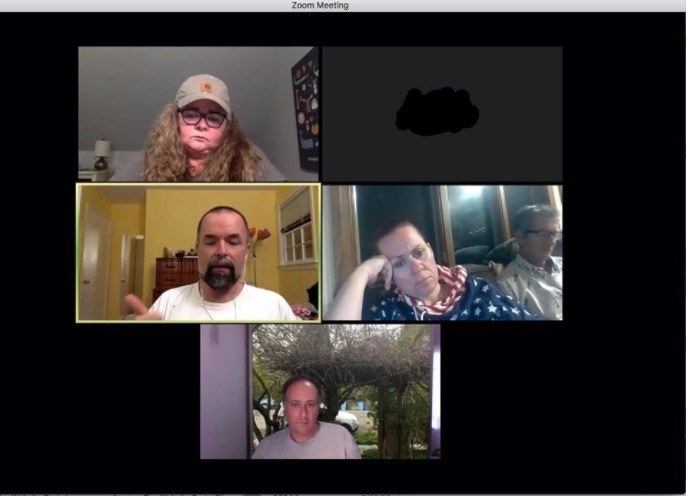
After McLaughlin was exposed as a racist by her former #MeTooSTEM colleagues who left in droves (leaving her running #MeTooSTEM alone with her brother), she added a new aspect to the #sciencing_bi persona: a Native-American (precisely Hopi) background. For that, the inventor has been liberally using demeaning tribespeople cliches she grabbed off Wikipedia, and everyone among McLaughlin’s White followers love those naive health talismans, hand-made bandanas and other Indian trinkets. There were critics who kept pointing out that @sciencing_bi didn’t seem to be a real person and might even be McLaughlin herself, but they were swiftly attacked and silenced, often by the same people who now profess to have exposed the fraud. Even when things really did not add up when @sciencing_bi’s COVID-19 death was announced, as this Arizona State University professor tweeted:
Now these same people portray themselves as the main tragic victims of McLaughlin’s sockpuppetting. In Science magazine, Michael Eisen is presented as the genius who really uncovered the #sciencing_bi scam, like a film noir detective who flirts with the femme fatale throughout the film, only to shoot her later.
The esteemed Society for Neuroscience even suddenly discovered that it might have been wrong to let McLaughlin troll the entire international neuroscience community. The scientists assumed @Jneuroscience was ran by the actual editors of the Journal of Neuroscience, and not simply by the ex-scientist McLaughlin having a laugh.
Now the academia can ponder if the Vanderbilt University was actually acting both wisely and bravely when denying tenure to McLaughlin, against massive campaigning led by her loyal army of followers and the Science magazine, who reminded everyone that the neuroscientist “has seven manuscripts in development and recently submitted a new NIH grant application.”
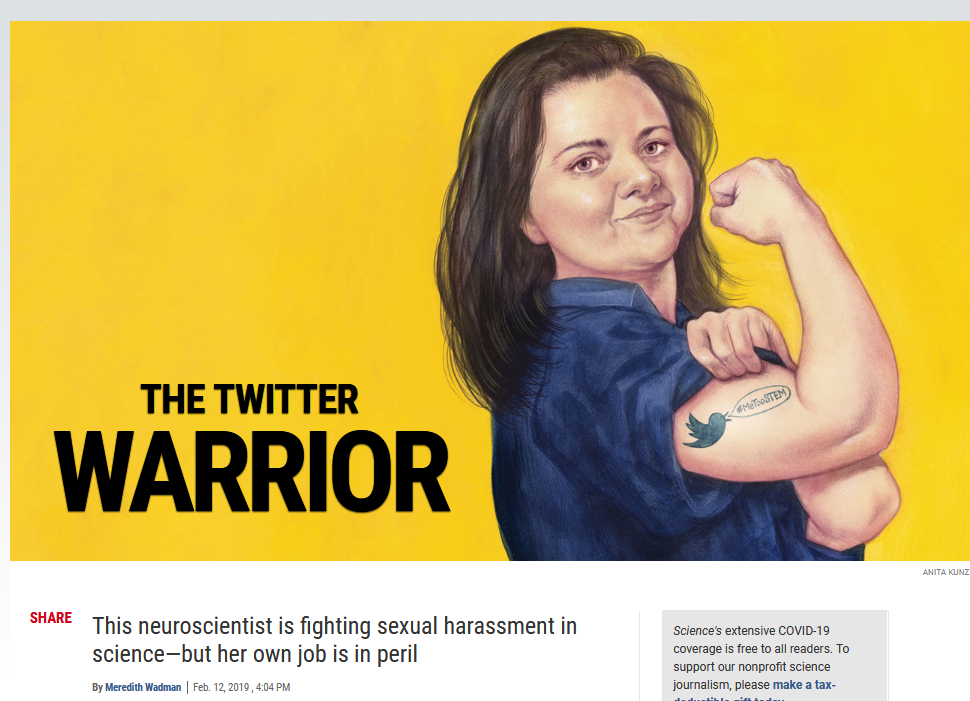
Was McLaughlin really a victim of retaliation for uncovering sexual harassment at Vanderbilt? Was there ever a student harassed by a gun-totting professor? What if McLaughlin actually wrongly accused a colleague to prevent her own sacking for harassment? What if that violent sexual abuse scandal she claims to have uncovered was just as made up as @sciencing_bi? Sure, we mustn’t trust Vanderbilt here, but recall that McLaughlin has embezzled gigantic sums of #MeTooSTEM donations, which she very likely used to try suing Vanderbilt and the alleged rapist in court, and obviously never got anywhere?
Update 27.01.2021 McLaughlin now admitted in court to have fabricated the charges against that colleague, Aurelio Galli.
Quote from McLaughlin’s own affidavit, dated 20 January 2021:
“Based on evidence provided by Dr. Galli and Vanderbilt, I confirm the following statements or suggestions and disavow any prior statement to the contrary:
a. Dr. Galli was not fired from Vanderbilt University, but resigned in good standing;
b. Dr. Galli was never found guilty of harassment or retaliation against me or, to my knowledge, any other person by Vanderbilt University or anyone else;
c. I have no personal knowledge lo support the allegation that Dr. Galli settled the
claims alleged against him in the lawsuit brought by Erin Watt. Those claims
were dismissed;
d. Dr. Galli’s laboratory was never sanctioned or punished by Vanderbilt University as a result of any investigation or lawsuit.“
Those exact same accusations, now proven as fabricated, set off the Twitter academia on its crusade against Vanderbilt and Galli, to avenge McLaughlin and get her tenure.
Let us recall that McLaughlin even admitted to have threatened her Vanderbilt colleagues using other sockpuppet Twitter accounts, one of which announced to “stab” a colleague. A source informed me that Professor McLaughlin also got in trouble for harassing a male student at Vanderbilt, who was unable to answer professor’s question, so the professor made him come to the front and do push-ups. I told some of that to a certain McLaughlin ally, Tisha Bohr, when she contacted me via Twitter direct message. Screenshots of my conversation were then tweeted (now unsurprisingly) by @sciencing_bi, to coordinate a revenge action for my questioning of McLaughlin’s western blots.

It is very likely that everything McLaughlin accused others of, was projecting of what she actually perpetrated herself, and more. But people either believed McLNeuro, or were afraid to be caught on not believing. Now, McLaughlin already started reincarnating herself, as a sufferer of a debilitating mental illness which makes her not responsible for her actions. New York Times already rolled out a psychologist to diagnose a Munchhausen-by-internet syndrome. I predict that very soon McLaughlin will present herself as a trauma victim, mentally destroyed by sexual harassment at Vanderbilt (which in reality never happened) and an advocate for mental health in STEM. Same people, like those from the Zoom Memorial, who now halfheartedly denounce her, might soon even facilitate her comeback.
Research Fraud is actually good science
And of course, it seems McLaughlin also engaged in massive research misconduct. Vanderbilt might have at least suspected that as well, and I did send them my December 2018 article as notification before the final tenure denial decision was made. But the following was found only days ago, in a paper from McLaughlin’s postdoc period, from the Pittsburgh University lab of Elias Aizenman.
BethAnn McLaughlin , Karen A Hartnett , Joseph A Erhardt, Jeffrey J Legos, Ray F White , Frank C Barone , Elias Aizenman Caspase 3 activation is essential for neuroprotection in preconditioning Proceedings of the National Academy of Sciences (2003) doi: 10.1073/pnas.0232966100
The paper was already criticised for showing western blots without loading control. But what Elisabeth Bik reported, was much worse.
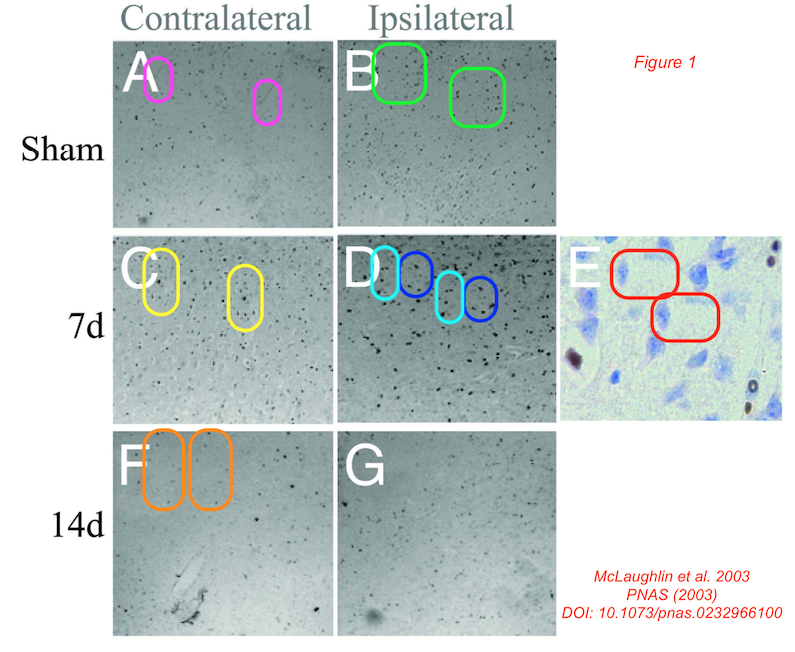
That is simply blatant research fraud, no guesses needed who did it. The duplicated image fragments cannot be explained otherwise. But wait, they can. Aizenman replied on PubPeer:
“The figure in question appears to have been manipulated. I do not understand the reason why or how this may have been done. The corresponding author, Dr. BethAnn McLaughlin has been contacted.
I will take the necessary steps, to the best of my abilities, to assess whether any additional potential alterations may have taken place.
The alleged manipulations, however, do not appear to impact the essence of the results. Indeed, following the publication of this paper, three independent labs confirmed the basic observation described in this study…”
Now that Aizenman explained to you that even a manipulative liar and data forger like McLaughlin must be trusted, here are some other scientists sharing their expert insights on the criticism of McLaughlin’s research (for details, see this article of mine from December 2018):
Here something more recent, from the Yale professor Michael Nitabach:
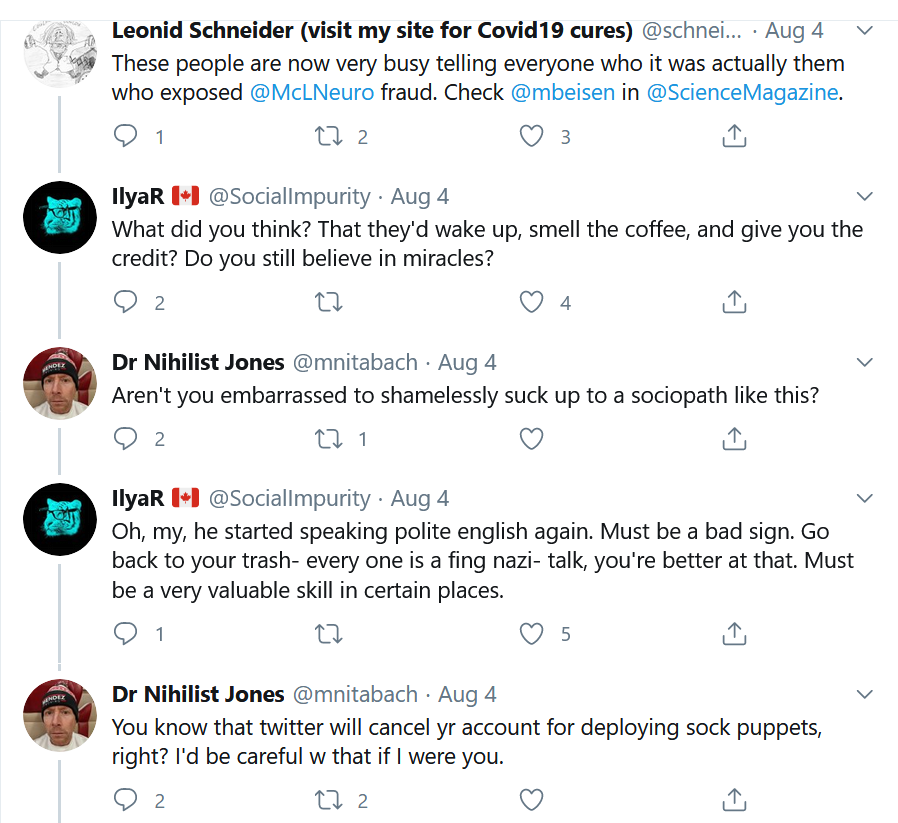
Now my suggestion: how about McLaughlin’s friends and admirers finally put a sock in it, on Twitter and in the newspapers? It is not about them. We need to hear other voices now, like this:
I would like to conclude with this Tweet from an eLife exec, responding to my tweets about @sciencing_bi affair:
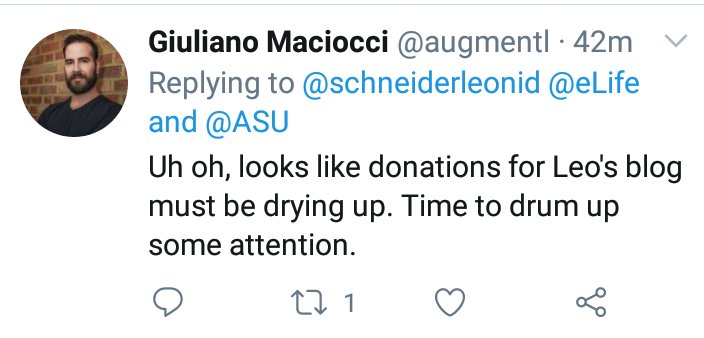
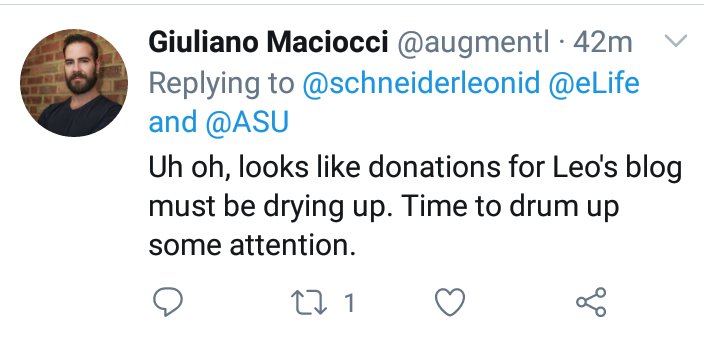
Donate!
If you are interested to support my work, you can leave here a small tip of $5. Or several of small tips, just increase the amount as you like (2x=€10; 5x=€25). Even eLife suggests this.
€5.00
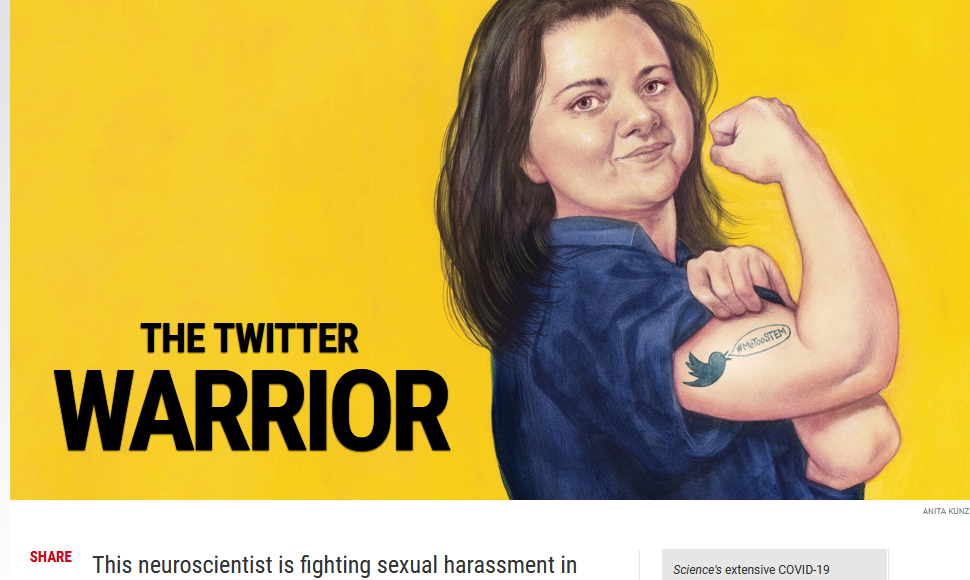
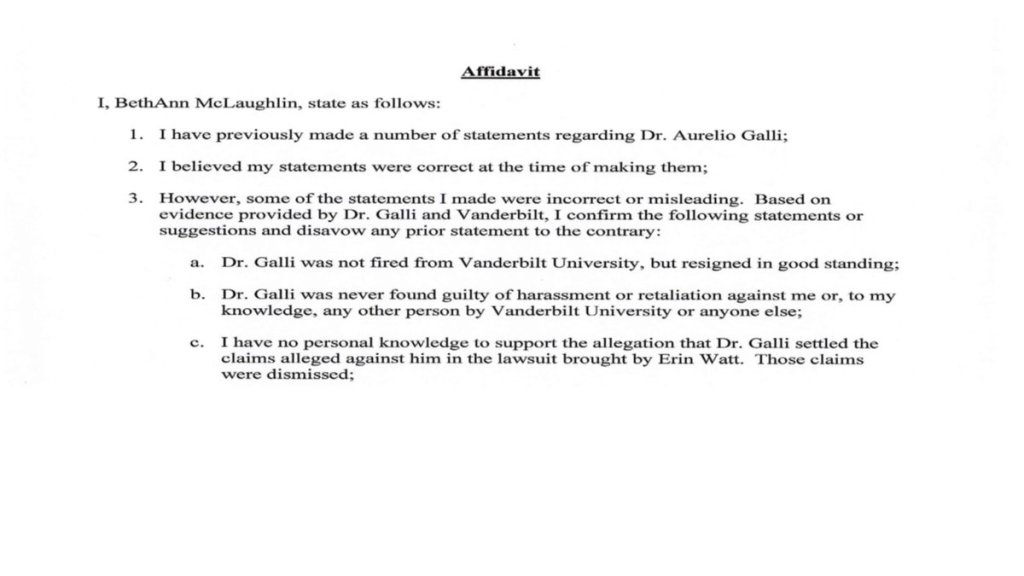
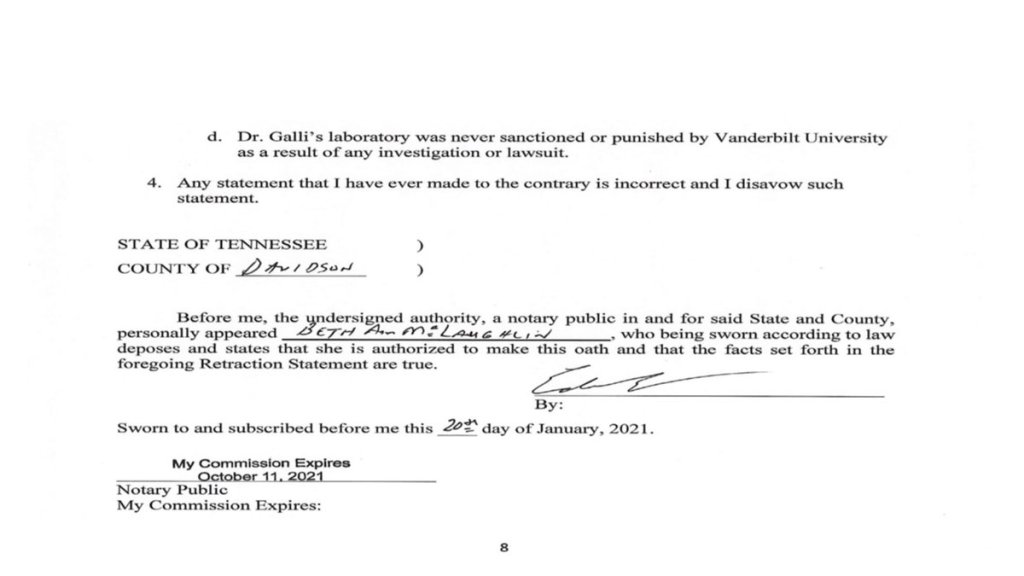

Nothing too much surprising: BETHANN MCLAUGHLIN probably is the rule not the exception having in consideration what you describe in this article.
LikeLike
I dunno, it was kinda difficult for me to get what this story was about. Semingly she is known in top circles of decision makers, and she was a sort of hero of diversity and inclusion. Now she had a fake twitter account, and what and how does it relate to what…? Did she gain anything from the twotter account? She got a job since she faked a sexual assault agiants herself? But anyway, google search gave me the impression is that she has a deteriorating health.
LikeLike
Well, if an individual is a failed scientist than he/she probably did not commit research fraud. OTOH, if they make it to faculty because of the needed CNS papers, you cannot be 100% sure.
LikeLike
All depends on your definition of success and failure. Where I work there are plenty of examples of people who cheat and still fail.
LikeLike
Pingback: "Falsità, falsità dappertutto!" - Ocasapiens - Blog - Repubblica.it
And that’s why you don’t use twitter. There are some benefits such as promoting your scientific work, but you have to be careful not to be sucked in by social interactions, which is hard to do if someone tags you to support something. It’s always a trap because then they will presume to know something about how you think and will try to engage you further. I do use it to promote my work, but the social media aspects of it are a big negative. Plus they are a monopoly that works together with America’s NSA if you care about that.
Unless you don’t take it seriously and post under a pseudonym who is separate from your real self I suppose, but that means you can’t promote your work, so ultimately it’s useless. Worse than a waste of time. Actively harmful to you career and maybe your sanity.
LikeLike
I will never understand how blatant faking like that above, detected by Bik but impossible not to see when it is pointed out, cannot immediately trigger retraction of the paper and some sort of serious sanctions on its lead author(s) at least.
In particular, Aizenmann’s statement “The alleged manipulations, however, do not appear to impact the essence of the results” is a shabby rhetorical trick. What he is calling “results” are a part of what the paper presents as evidence for certain claims about how the world works. When palpably manipulated and therefore false material is included in the evidence, it impeaches the entire argument, and none of the “results” can be assumed to be trustworthy. Whether or not those claims eventually turn out to be true, on the basis of others’ (honest) work, Aizenmann et al.’s doctored paper cannot be said to have contributed to the proof, and Aizenmann et al. must have none of the credit.
LikeLike
Pingback: Neanderthals abused to support bully Alan Cooper – For Better Science